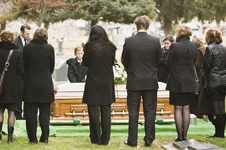 When a delinquent homeowner dies, there is a strict one-year statute of limitations to sue them or to continue a lawsuit against their estate. (Cal. Code Civ. Proc. § 366.2). This is true even if the statute of limitations would have been longer had the person survived. This harsh rule applies even if you did not know that the person died so Boards and management should take notice if a homeowner does not respond to communications or suddenly falls in arrears and then investigate further by contacting family members or emergency contacts during circumstances of non-responsiveness and/or extended non-payment.
When a delinquent homeowner dies, there is a strict one-year statute of limitations to sue them or to continue a lawsuit against their estate. (Cal. Code Civ. Proc. § 366.2). This is true even if the statute of limitations would have been longer had the person survived. This harsh rule applies even if you did not know that the person died so Boards and management should take notice if a homeowner does not respond to communications or suddenly falls in arrears and then investigate further by contacting family members or emergency contacts during circumstances of non-responsiveness and/or extended non-payment.
The second important rule when a debtor dies is that when a probate estate has opened, any creditor has only four months from the date the executor or administrator is appointed to file a claim in probate. (Cal. Code Civ. Proc. § 377.40; Prob. Code §§ 9100 et seq.). Sometimes the decedent has no family or heirs or the heirs fail to open a probate. In this case, the HOA may reach out to the public administrator in the county where the real property is located to request that they open a probate. If this is not done, then it is incumbent on the HOA to open the probate as a creditor to ensure that the above-referenced statute of limitations does not run. (See Prob. Code §§800; 48).
Since a dead person cannot be sued, the HOA must sue the estate of the decedent. If a lawsuit was filed while the homeowner was alive, but they are now deceased, a motion should be timely filed to substitute the deceased person with their estate. (Cal Code Civ. Proc. § 377.31). Counsel should be mindful that the motion must be filed within three (3) months of the rejection of the HOA’s creditor’s claim, which is deemed rejected if not responded to within thirty (30) days of submission. (Prob. Code §§ 9256, 9352, 9353, 9371). It is important to note that once the creditor’s claim is filed, the one-year time bar pursuant to Code of Civil Procedure §366.2 is tolled. Nevertheless, the creditor’s claim must be filed within one year of the decedent’s death or the claim is barred entirely.
Thankfully, the above harsh requirements do not apply when the debt is one that can be secured via a lien on real property that may be foreclosed, such as with assessment liens. This is because such debt attaches to the property and not to the deceased person.
| The death of a delinquent homeowner can pose complex and time-sensitive challenges. This is why HOA’s should promptly contact their counsel or collections professional for assistance in the event of a delinquent homeowner’s death. |
-Blog post authored by TLG Attorney, Carrie N. Heieck, Esq.
 HOA Lawyer Blog
HOA Lawyer Blog

